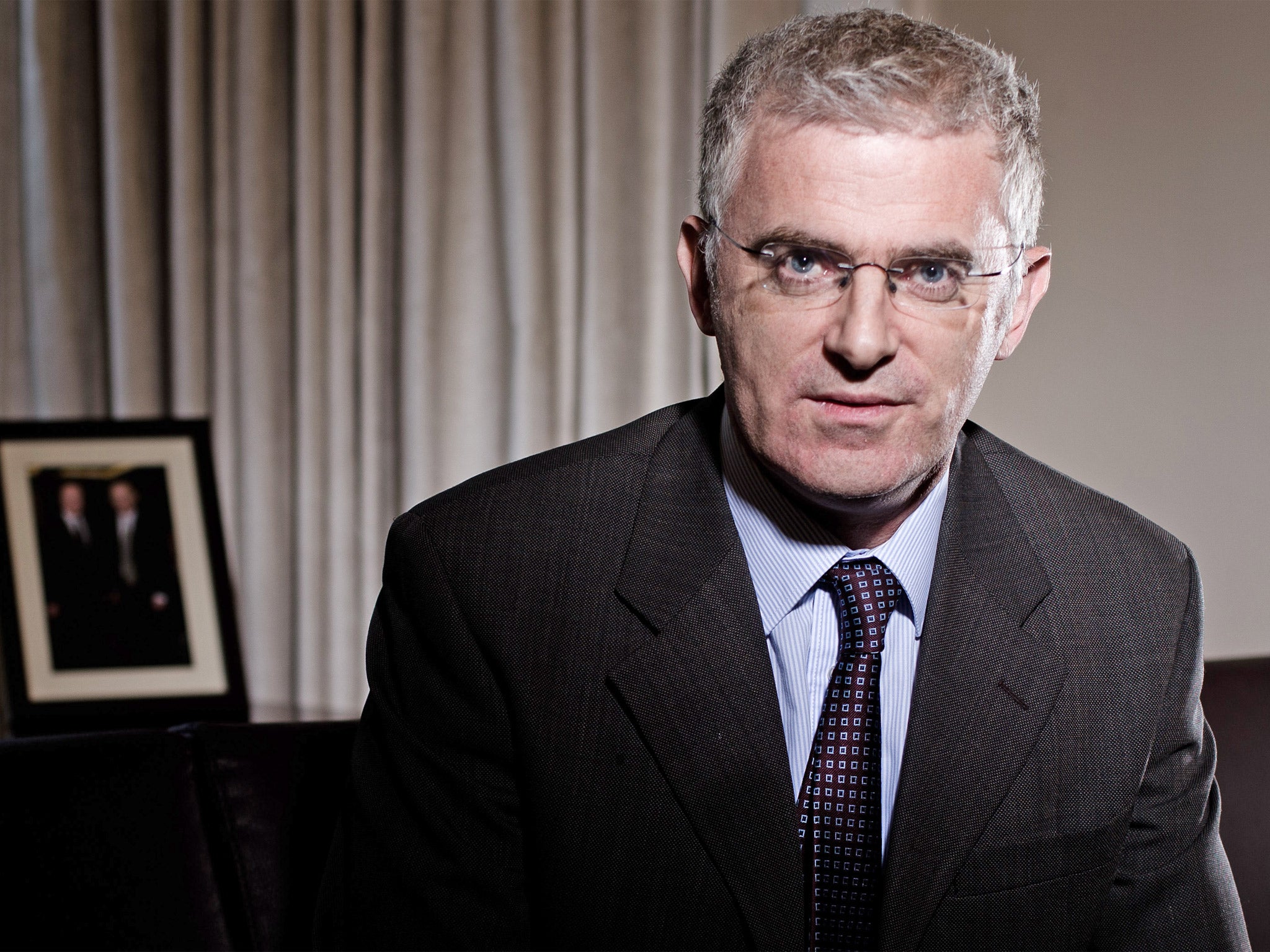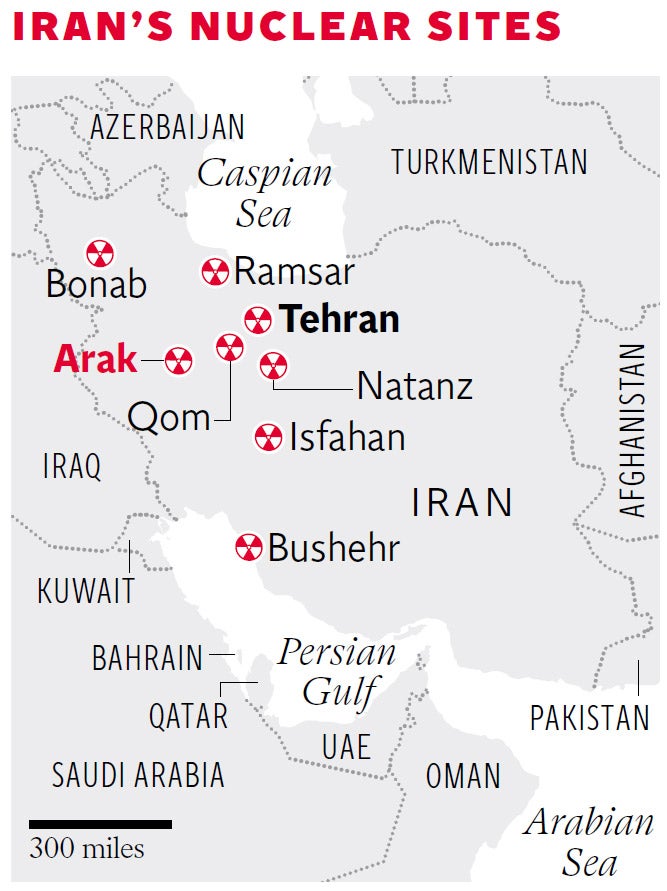'Iran will still make a nuclear bomb': Israel’s ambassador to the UK Daniel Taub argues the Geneva deal endangers us all
Daniel Taub tells Alistair Dawber that the Jewish state may be prepared to forge deals with long-standing enemies in the Middle East to counter what he describes as ‘Tehran-sponsored Shia alliances’

Israel’s ambassador to the UK has floated the idea of new alliances forming in the Middle East between the Jewish state and long-standing antagonists in a bid to counter the perceived threat posed by Iran’s nuclear ambitions, which have not been assuaged, he says, by last weekend’s deal between Tehran and world powers.
Speaking to The Independent Daniel Taub reasserted Israel’s firmly held view that the Geneva accord, signed at 4am on Sunday morning, will do little to contain the threat posed by Iran, or to slow its progress towards acquiring a nuclear weapon.
However, as well as maintaining pressure on traditional allies – an Israeli national security team arrived in Washington for talks with American officials yesterday – the situation may call for more radical partnerships that have hitherto been unthinkable, he says. Speaking of the opposition to Tehran-sponsored Shia alliances in the Middle East, Mr Taub raised to prospect of cooperation between Israel and a number of predominantly Sunni countries, including the Gulf states and Saudi Arabia, that are equally concerned about a nuclear Iran.
“If you look at the region you see this very radical axis that runs from Tehran to Damascus to Beirut and actually on to Gaza, and I think that we are not alone [in being worried] about it,” he said.
“There are many countries that look on these issues and it’s a reminder that if we can rise above some of our immediate differences and paradigms we actually have an awful lot in common, many of our most fundamental strategic concerns are actually aligned, and of course we would be interested in trying to deepen relationships on that basis.”
Asked if he was hopeful that such relationships might be possible, despite long-standing disputes regarding the Israeli occupation of the Palestinian Territories, Mr Taub said: “I think the changes in our region are forcing many parties to make choices that they hadn’t had to make before. That creates a moment of opportunity for us. I think that there are elements within countries in the region that now see that Israel can be a partner for some of the things they want. Those parts of the Middle East that are forward looking, that want to develop prosperity… there are people that are asking these questions and that’s a possibility for thinking about some sort of relationship.”
One relationship that Mr Taub insists is still healthy, despite Israel adamant opposition to last weekend’s deal, is that which it shares with its Western allies. Since the deal with Iran was announced, its sponsors have lauded it as the first meaningful breakthrough in diplomacy with the Islamic Republic since 1979. In the House of Commons on Monday, Foreign Secretary William Hague was praised on all sides for the UK’s part in the deal, which is initially for six months and will see some sanctions on Iran eased in return for guarantees over uranium enrichment and greater access for UN inspectors.
Mr Hague said that “Iran has made a number of very significant commitments,” and that the deal was the, “first step on the long journey to making the Middle East – and the whole world – safer from nuclear proliferation.”

Israel simply does not accept this and is firmly of the opinion that that journey is setting off in the wrong direction. Mr Taub said the deal will not prevent Iran from acquiring the bomb, and may not even slow down its progress.
“Our concern is that this deal doesn’t provide everything that’s necessary. We look at the deal and we see that the entire mechanism, the infrastructure that’s been established, by deceit, under the nose [of the International Atomic Energy Agency] is really left intact. Not a single centrifuge is dismantled, not a single aspect of the Arak plutonium heavy water reactor, not a single aspect of the military aspect of the programme is actually dismantled. It all remains in place.
“The 10,200 centrifuge that were spinning on the eve of the agreement will still be spinning on the day after the agreement.
“Our fundamental concern is that at the end of this six-month period… Iran is not going to be further away from being a nuclear weapons state – it might actually be closer to it. We’re troubled by what’s in the agreement; we’re troubled by differences. One of the things that is troubling to us is that within less than a day of the signing of this agreement there seemed to be a fairly fundamental difference of interpretation between Iran and the negotiators over the right of enrichment [Iran says the agreement enshrines its right to enrich, the Western powers disagree]. If there’s such a fundamental difference on principle, then what are we going to do when it comes to issues of practice?”
Many in Israel have reacted with anger to the agreement. Naftali Bennett, an Israeli cabinet minister, warned that “if a nuclear suitcase blows up five years from now in New York or Madrid, it will be because of the deal that was signed this morning.”
Mr Taub’s analysis may not be too far from Mr Bennett’s, but his method of opposing the deal is to dissect it. The P5 +1 – the five permanent members of the UN Security Council along with Germany – and Iran agreed that Tehran will cease to enrich uranium above 5 per cent and to dilute its stockpile of uranium that is already enriched beyond that level, a key element needed to manufacture a bomb. “We’re concerned that some of those elements [of agreement] may be being oversold and perhaps they are less significant than they seem,” he says.
“For example, a lot of attention is being given to the fact that there are restrictions on enriching to over 5 per cent, but we were very concerned about that a year, a year and half ago. We’re still concerned about it but it’s less of an issue today because Iran has these high speed centrifuges that enable it to get from 3.5 per cent to weapons grade,] so it’s less significant [now].”
Mr Taub’s problem, and that of his government, is that Iran has come in from the cold. The election of Hassan Rouhani as Iran’s president in the summer, replacing the hardline Mahmoud Ahmadinejad, has been seized on by the West as an opportunity to do a deal. Mr Ahmadinejad, on the record as a denier of the Holocaust was easy to isolate, but Mr Rouhani is a trickier opponent. He is portrayed by Tehran as a moderate – someone the West can do business with, and this has been bought in Western capitals, the Israelis argue.
But in many ways, it is even worse than that for Israel. It transpired after the accord was reached at the weekend that the Geneva deal was the result of a year of direct, and secret, talks between Washington and Tehran. And that means that the Americans were dealing directly with the Israel-hating Ahmadinejad regime.
In the hours following the agreement, Mr Taub’s prime minister, Benjamin Netanyahu and President Obama shared what has been described as an angry phone call. One thing the Israelis know now is that they have closer potential allies than the US when it comes to the question of Iran’s nuclear ambitions.
The fallout: International reaction
‘This agreement has made the world a much more dangerous place’ – Benjamin Netanyahu, Israeli Prime Minister
‘The Saudi government has been very concerned about these negotiations with Iran and unhappy at the prospect of a deal with Iran’ – unnamed Saudi official
‘If Iran does not fully meet its commitments during this six-month phase, we will turn off the relief and ratchet up the pressure’ – Barack Obama
‘We should make unremitting efforts to solve Iran’s nuclear issue in a long-term, comprehensive and solid way’ – Qui Gong, Chinese Foreign Ministry
‘A breakthrough step has been made, but only the first on a long and difficult path. As the result of talks...we managed to get closer to untying one of the most difficult knots in world politics’ – Vladimir Putin
‘The deal demonstrates how persistent diplomacy and tough sanctions can together help us to advance our national interest’ – David Cameron
‘A victory for the logic of dialogue and political work over the logic of threats, ultimatums, challenges and wars’ – Omran al-Zoubi, Syrian Information Minister
Victorian Finan
Join our commenting forum
Join thought-provoking conversations, follow other Independent readers and see their replies
Comments